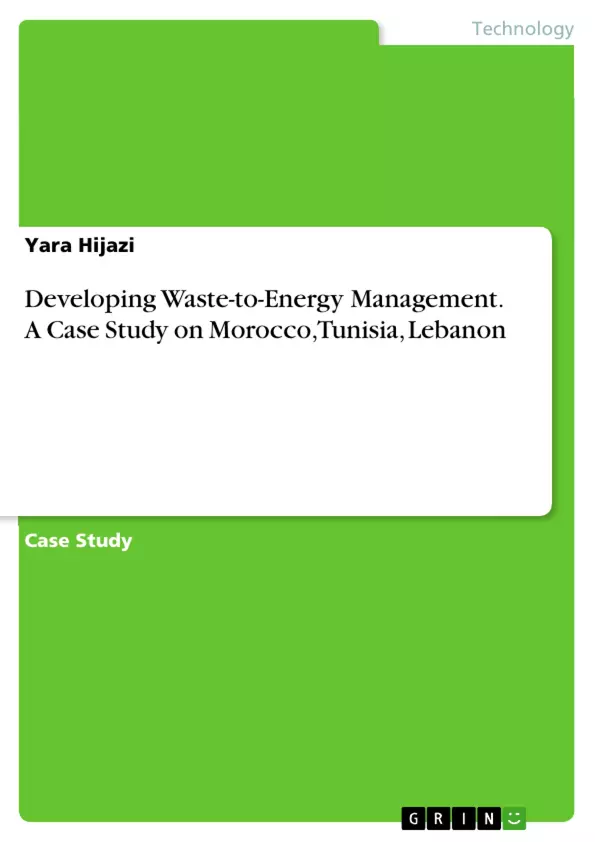This policy paper demonstrates the waste crisis in Morocco, Tunisia, and Lebanon; countries located in the MENA region. It highlights how all three countries are facing a 1.5-3 % increase in waste generation and the urgency for a sustainable and innovative solution. Given that they all have more than 50% of organic waste generated in their composition, a waste-to-energy approach is most suitable. This policy targets various stakeholders such as Ministries, Nationals, and private associations and donors for involvement.
Among the different solutions suggested, methane capturing and upgrading is suggested (short-term), as well as anaerobic digestion and pyrolysis (long-term). Also, a monitoring and evaluation plan was suggested. Finally, recommendations were placed based on best practices to ensure the sustainable future in terms of waste-to-energy management in these three countries.
Inhaltsverzeichnis (Table of Contents)
- State of the Art
- Morocco
- Tunisia
- Lebanon
- Scope
- Target Sectors
- Implementation: Possible Solutions and Time Dimensions
- Short term possible solutions
- Long term possible solutions
- Monitoring and Review
- Recommendation
- Conclusion
Zielsetzung und Themenschwerpunkte (Objectives and Key Themes)
This policy paper examines the waste management challenges facing Morocco, Tunisia, and Lebanon, highlighting the critical need for sustainable solutions in the MENA region. It emphasizes the urgency of addressing the escalating waste generation rates, with a focus on organic waste, and proposes a waste-to-energy approach as a viable solution. The paper targets various stakeholders, including ministries, citizens, and private organizations, for collaborative action.
- Waste Crisis in the MENA Region
- Sustainable Waste-to-Energy Solutions
- Stakeholder Collaboration and Policy Framework
- Short-term and Long-term Solutions for Waste Management
- Monitoring and Evaluation of Waste-to-Energy Initiatives
Zusammenfassung der Kapitel (Chapter Summaries)
- State of the Art: This section provides an overview of the waste management situation in Morocco, Tunisia, and Lebanon, highlighting the waste composition, generation rates, and current treatment methods. It emphasizes the challenges posed by increasing waste generation and the potential for waste-to-energy solutions.
- Scope: This chapter outlines the scope of the policy paper, defining the target countries and the specific aspects of waste management addressed. It highlights the focus on sustainable waste-to-energy solutions and the need for collaborative action among stakeholders.
- Target Sectors: This section identifies the key sectors involved in waste management and the specific challenges faced by each sector. It highlights the need for a multi-sectoral approach to address the waste crisis.
- Implementation: Possible Solutions and Time Dimensions: This chapter explores the potential solutions for waste-to-energy management, categorized into short-term and long-term solutions. It discusses various technologies, such as methane capturing and upgrading, anaerobic digestion, and pyrolysis, and outlines the feasibility of each approach.
- Monitoring and Review: This section focuses on the importance of monitoring and evaluation in assessing the effectiveness of waste-to-energy initiatives. It highlights the need for data collection, analysis, and regular review to ensure the long-term sustainability of the proposed solutions.
Schlüsselwörter (Keywords)
Waste management, waste-to-energy, MENA region, Morocco, Tunisia, Lebanon, organic waste, methane capturing, anaerobic digestion, pyrolysis, sustainability, stakeholder engagement, policy framework, monitoring and evaluation.
- Quote paper
- Yara Hijazi (Author), 2017, Developing Waste-to-Energy Management. A Case Study on Morocco, Tunisia, Lebanon, Munich, GRIN Verlag, https://www.hausarbeiten.de/document/1146721


